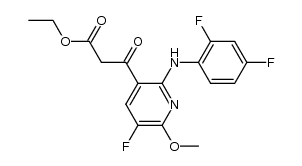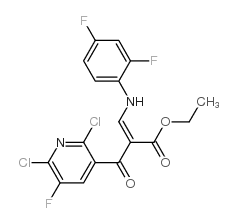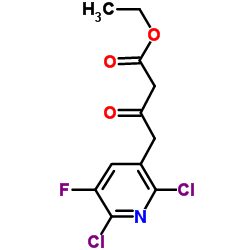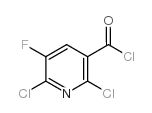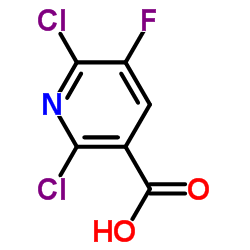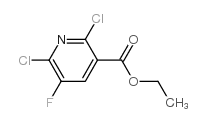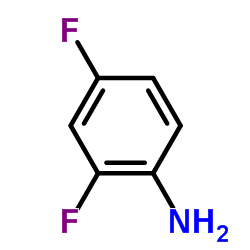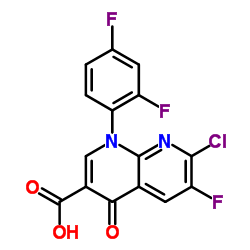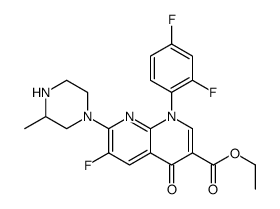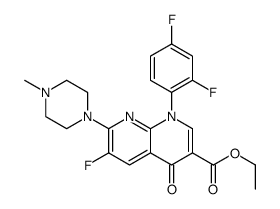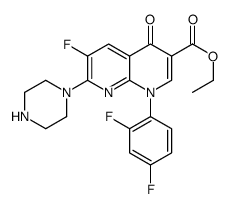100491-29-0
| Name | ethyl 1-(2,4-difluorophenyl)-7-choro-6-fluoro-4-oxo-hydropyridino[2,3-b] pyridine-3-carboxylate |
|---|---|
| Synonyms |
MFCD01863285
Ethyl 7-chloro-1-(2,4-difluorophenyl)-6-fluoro-4-oxo-1,4-dihydro-1,8-naphthyridine-3-carboxylate 1,8-Naphthyridine-3-carboxylic acid, 7-chloro-1-(2,4-difluorophenyl)-6-fluoro-1,4-dihydro-4-oxo-, ethyl ester Ethyl 7-chloro-1-(2,4-difluorophenyl)-6-fluoro-1,4-dihydro-4-oxo-1,8-naphthyridine-3-carboxylate T66 BV EN GNJ CVO2 ER BF DF& HG IF Ethyl 1-(2,4-difluorophenyl)-7-Cl-6-F-4-O-hydropyridino[2,3-b]pyridine-3-carboxylate ethyl 7-chloro-1-(2,4-difluorophenyl)-6-fluoro-4-oxo-1,8-naphthyridine-3-carboxylate |
| Density | 1.5±0.1 g/cm3 |
|---|---|
| Boiling Point | 502.5±50.0 °C at 760 mmHg |
| Melting Point | 212-215ºC |
| Molecular Formula | C17H10ClF3N2O3 |
| Molecular Weight | 382.721 |
| Flash Point | 257.7±30.1 °C |
| Exact Mass | 382.033203 |
| PSA | 61.19000 |
| LogP | 2.71 |
| Vapour Pressure | 0.0±1.3 mmHg at 25°C |
| Index of Refraction | 1.589 |
Synonym: Section 2 - COMPOSITION, INFORMATION ON INGREDIENTS
Risk Phrases: 36/37/38 Section 3 - HAZARDS IDENTIFICATION EMERGENCY OVERVIEW
Irritating to eyes, respiratory system and skin. Potential Health Effects Eye: Causes eye irritation. Skin: Causes skin irritation. May be harmful if absorbed through the skin. Ingestion: May cause irritation of the digestive tract. May be harmful if swallowed. Inhalation: Causes respiratory tract irritation. May be harmful if inhaled. Chronic: Not available. Section 4 - FIRST AID MEASURES Eyes: Flush eyes with plenty of water for at least 15 minutes, occasionally lifting the upper and lower eyelids. Get medical aid. Skin: Get medical aid. Flush skin with plenty of water for at least 15 minutes while removing contaminated clothing and shoes. Ingestion: Get medical aid. Wash mouth out with water. Inhalation: Remove from exposure and move to fresh air immediately. If not breathing, give artificial respiration. If breathing is difficult, give oxygen. Get medical aid. Notes to Physician: Section 5 - FIRE FIGHTING MEASURES General Information: As in any fire, wear a self-contained breathing apparatus in pressure-demand, MSHA/NIOSH (approved or equivalent), and full protective gear. Extinguishing Media: Use foam, dry chemical, or carbon dioxide. Section 6 - ACCIDENTAL RELEASE MEASURES General Information: Use proper personal protective equipment as indicated in Section 8. Spills/Leaks: Vacuum or sweep up material and place into a suitable disposal container. Section 7 - HANDLING and STORAGE Handling: Avoid breathing dust, vapor, mist, or gas. Avoid contact with skin and eyes. Storage: Store in a cool, dry place. Store in a tightly closed container. Section 8 - EXPOSURE CONTROLS, PERSONAL PROTECTION Engineering Controls: Use adequate ventilation to keep airborne concentrations low. Exposure Limits CAS# 100491-29-0: Personal Protective Equipment Eyes: Not available. Skin: Wear appropriate protective gloves to prevent skin exposure. Clothing: Wear appropriate protective clothing to prevent skin exposure. Respirators: Follow the OSHA respirator regulations found in 29 CFR 1910.134 or European Standard EN 149. Use a NIOSH/MSHA or European Standard EN 149 approved respirator if exposure limits are exceeded or if irritation or other symptoms are experienced. Section 9 - PHYSICAL AND CHEMICAL PROPERTIES Physical State: Powder Color: almost white Odor: Not available. pH: Not available. Vapor Pressure: Not available. Viscosity: Not available. Boiling Point: Not available. Freezing/Melting Point: 212-215 C Autoignition Temperature: Not available. Flash Point: Not available. Explosion Limits, lower: Not available. Explosion Limits, upper: Not available. Decomposition Temperature: Solubility in water: Specific Gravity/Density: Molecular Formula: C17H10ClF3N2O3 Molecular Weight: 382.5298 Section 10 - STABILITY AND REACTIVITY Chemical Stability: Not available. Conditions to Avoid: Incompatible materials. Incompatibilities with Other Materials: Strong oxidizing agents, acids, acetic anhydride, acid chlorides, carbon dioxide. Hazardous Decomposition Products: Hydrogen chloride, nitrogen oxides, carbon monoxide, carbon dioxide, hydrogen fluoride gas. Hazardous Polymerization: Has not been reported Section 11 - TOXICOLOGICAL INFORMATION RTECS#: CAS# 100491-29-0 unlisted. LD50/LC50: Not available. Carcinogenicity: Ethyl-1-(2,4-difluorophenyl)-7-Cl-6-F-4-oxohydropyridino[2,3 - Not listed by ACGIH, IARC, or NTP. Section 12 - ECOLOGICAL INFORMATION Section 13 - DISPOSAL CONSIDERATIONS Dispose of in a manner consistent with federal, state, and local regulations. Section 14 - TRANSPORT INFORMATION IATA No information available. IMO No information available. RID/ADR No information available. Section 15 - REGULATORY INFORMATION European/International Regulations European Labeling in Accordance with EC Directives Hazard Symbols: XI Risk Phrases: R 36/37/38 Irritating to eyes, respiratory system and skin. Safety Phrases: S 26 In case of contact with eyes, rinse immediately with plenty of water and seek medical advice. S 37/39 Wear suitable gloves and eye/face protection. WGK (Water Danger/Protection) CAS# 100491-29-0: No information available. Canada None of the chemicals in this product are listed on the DSL/NDSL list. CAS# 100491-29-0 is not listed on Canada's Ingredient Disclosure List. US FEDERAL TSCA CAS# 100491-29-0 is not listed on the TSCA inventory. It is for research and development use only. SECTION 16 - ADDITIONAL INFORMATION N/A |
| Hazard Codes | Xi: Irritant; |
|---|---|
| Risk Phrases | R36/37/38 |
| Safety Phrases | 37/39-26 |
| HS Code | 29339980 |
|
~72% 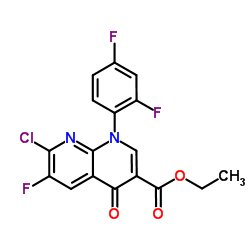
100491-29-0 |
| Literature: Toyama Chemical Co., Ltd. Patent: US4704459 A1, 1987 ; |
|
~89% 
100491-29-0 |
| Literature: Chu, Daniel T. W.; Fernandes, Prabhavathi B.; Claiborne, Akiyo K.; Gracey, Eugene H.; Pernet, Andre G. Journal of Medicinal Chemistry, 1986 , vol. 29, # 11 p. 2364 - 2369 |
|
~% 
100491-29-0 |
| Literature: Journal of Medicinal Chemistry, , vol. 29, # 11 p. 2364 - 2369 |
|
~% 
100491-29-0 |
| Literature: Journal of Medicinal Chemistry, , vol. 29, # 11 p. 2364 - 2369 |
|
~% 
100491-29-0 |
| Literature: Journal of Medicinal Chemistry, , vol. 29, # 11 p. 2364 - 2369 |
|
~% 
100491-29-0 |
| Literature: Journal of Medicinal Chemistry, , vol. 29, # 11 p. 2364 - 2369 |
|
~% 
100491-29-0 |
| Literature: Journal of Medicinal Chemistry, , vol. 35, # 3 p. 518 - 525 |
|
~% 
100491-29-0 |
| Literature: Journal of Medicinal Chemistry, , vol. 35, # 3 p. 518 - 525 |
| Precursor 7 | |
|---|---|
| DownStream 4 | |


